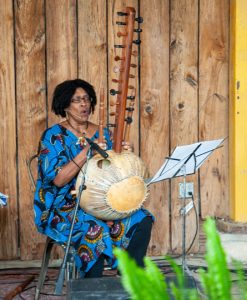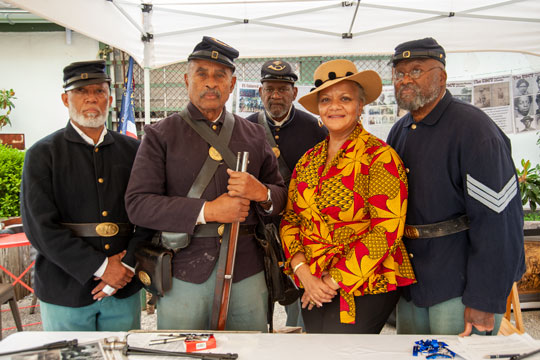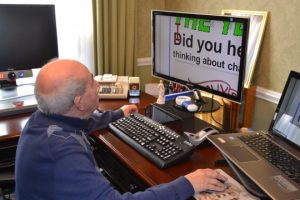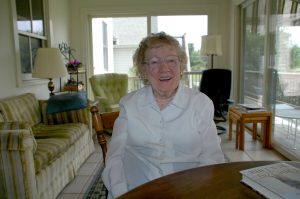The Creamery in Kennett Square paid homage to Juneteenth Saturday with a program of music, reenactors, and discussions about emancipation and the end of slavery.
Juneteenth, which became a Pennsylvania holiday in 2019 and a federal holiday in 2021, commemorates the emancipation of the slaves at the end of the Civil War. It marks the anniversary of Union Army Gen. Gordon Granger announcing in Galveston, Texas, General Order No. 3 proclaiming emancipation of all slaves in Texas. That announcement came on June 19, 1865.
For some, Juneteenth is as significant as July 4th, some even think it’s an extension of that earlier Independence Day.
The event in Kennett was organized by Voices Underground, a storytelling organization whose goal, according to its Co-Executive Director Alexander Parham, is to heal the country through storytelling.
“We’re looking to reimagine history in a way that includes all the stories that are part of the American narrative, and our particular interest is African American history,” he said.

“We try to tell stories that haven’t been told before, and especially for a group like African Americans, most of those have been buried, untold, fragmented A lot of information is not there. We want to be the catalyst to bring scholarship, bring facts to bring the data.”
Among those stories, he said, are those about Thomas Jefferson, and his relationship with blacks as a slave owner. Parham said much of the story of the Monticello plantation is the story of Jefferson and his relationship with Sally Hemmings, a slave with whom it’s said he fathered a child. Parham said some of that story is denied.
“It’s still deemed as a rumor,” Parham said, “but it happened. It’s been proven that it happened.”
Acknowledging Jefferson’s eloquence when it came to the concept of liberty, but practicing the opposite as a slave owner, Parham said that the dichotomy should also be told.
“It’s not to shame, it’s about getting hold of both sides so you can progress to imagine a new future.”
Holding the event in Kennett can also be seen as significant because, as author Mark Lanyon said, Kennett is considered the hub of the Underground Railroad. In Lanyard’s book, “Abolition & the Underground Railroad in Chester County, Pennsylvania” Harriet Tubman took refuge in Kennett Square while leading escaped slaves to the north.
“There were more Underground Railroad stations in the Kennett area than anywhere else in the country,” he said.
While much of that is known, Lanyard said he learned more while researching the book. Specifically, he said, he learned that there was a split within the Quaker community. According to Lanyon, the conservative Quakers held that not owning slaves was good enough, while progressive Quakers said they should actively oppose slavery and argue for abolition.
He went on to say that six of the progressive Quakers from the area met with President Abraham Lincoln in June of 1862 presenting him with a petition requesting emancipation and an end to slavery. Lincoln sent a draft of the proclamation to Congress in August, and it was issued in January 1863.
And that line from the Emancipation Proclamation to Juneteenth is part of what author Cheryl Renée Gooch explores in her book, “Hinsonville’s Heroes: Black Civil War Soldiers of Chester County Pennsylvania.”
And that, too, ties into Parham’s thoughts about telling those unknown—or little known—stories.
Hinsonville, she said, was an antebellum-free community that is now encompassed by the campus of Lincoln University. In its time, there were many African American landowners in Hinsonville, and that is significant, she said. It was founded by African Americans in the 1830s, many of whom had been slaves.
“They were clearly determined to be free people. They formed a community, largely of farmers and shop owners. What was significant about this former community of Hinsonville is that it is the epicenter of the founding of what became Lincoln University,” Gooch said.
Gooch, a former Dean of the School of Arts, Humanities and Social Sciences at Lincoln University, said the community maintained its stability with the establishment of a church. And it was members of that church who were instrumental in the abolition of slavery.
“In this, now within this largely forgotten community, you had residents and landowners who were involved in major social movements of the 19th century,” she said adding, “They sent at least 18 of their men to serve as members of the United States Colored Troops who were among 200,000 African American men who fought to reunify our country and abolish slavery.”
Many of those men served in the 54th Massachusetts Regiment that was portrayed in the movie “Glory.”
Gooch went on to say that slavery, abolition of slavery, and the celebration of Juneteenth are all part of our history as Americans.
“The Emancipation Proclamation of 1863 and the 1865 proclamation were part of a continuum of the beginning of the end of slavery,” she said.
Slavery ended with the ratification of the 13th Amendment in December of 1865. And Juneteenth is seen as a major part of that story.
About Rich Schwartzman
Rich Schwartzman has been reporting on events in the greater Chadds Ford area since September 2001 when he became the founding editor of The Chadds Ford Post. In April 2009 he became managing editor of ChaddsFordLive. He is also an award-winning photographer.




Comments